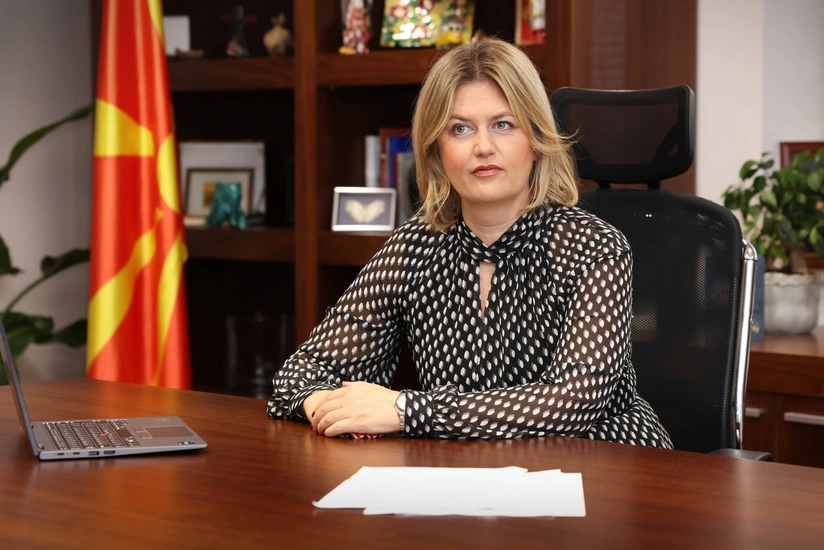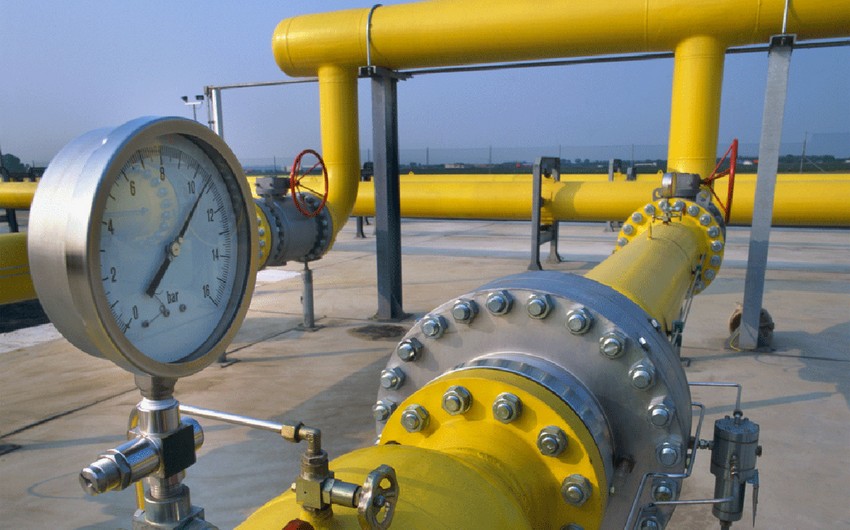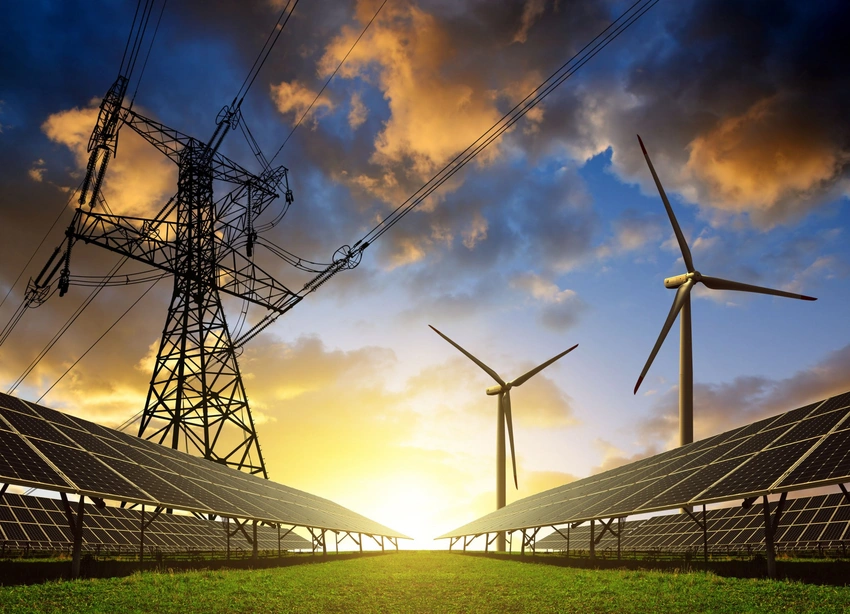Minister: North Macedonia expects direct supplies of Azerbaijani gas in coming years - INTERVIEW
- 08 September, 2025
- 12:53

North Macedonia and Azerbaijan are strengthening their cooperation in the energy sector, focusing on renewable energy, regional integration, and diversification of gas supplies. Skopje views Baku as a reliable partner in ensuring the sustainability of energy supplies and developing infrastructure in South-Eastern Europe. Particular attention is paid to the prospects for Azerbaijan's participation in gasification, joint green projects, and the formation of conditions for the energy transition, including carbon pricing and the development of a hydrogen strategy.
In an exclusive interview with Report, Sanja Bozinovska, Minister of Energy, Mining and Mineral Resources of North Macedonia, spoke about key areas of cooperation, barriers, and opportunities for expanding the partnership.
Report presents the interview:
- Which areas do you consider most promising for the development of energy cooperation between North Macedonia and Azerbaijan – hydrocarbon supplies, renewable energy, energy infrastructure, or technology transfer?
- The most promising areas are renewable energy, energy infrastructure, and technology transfer. Our country has limited domestic hydrocarbon resources, which makes renewable sources and secure access to natural gas especially important. Cooperation with Azerbaijan can bring tangible benefits in diversifying supply and supporting our energy transition.
Equally important is collaboration in renewable energy sources and technology transfer, in line with our commitment to the Green Agenda and the legally binding obligations for greenhouse gas emissions reduction under the Paris Agreement.
- How important is energy integration into regional and trans-European projects for North Macedonia? What role do you assign to Azerbaijan in strengthening the energy security of the Southeast European region?
- Regional integration and market coupling are among our top national priorities. As a Contracting Party of the Energy Community Secretariat, we are obliged to transpose the EU energy acquis into national legislation. As an EU candidate country, we have already joined the CESEC Regional Initiative and the EUSAIR Strategy, proving our proactive role in integration. The Southern Gas Corridor, where Azerbaijan plays a decisive role, is essential for strengthening gas security and supply reliability in Southeast and Central Europe. This has become even more relevant after Russia halted gas deliveries through Ukraine as of January 1, 2025. As a country, we are strongly interested in purchasing Azerbaijani gas for industrial, commercial, and household use. Azerbaijan has already proven itself as a reliable partner, and its role will grow further in ensuring stability and diversification of supply for our region.

- In your opinion, what barriers are currently hindering the expansion of energy cooperation between our countries? What steps could be taken to overcome them?
- There are no political barriers between our countries. With mutual political will, progress can be made swiftly. The challenges are mostly technical – infrastructure limitations, insufficient interconnectivity, and the pace of financing and administrative procedures. These can be overcome through joint efforts, EU-supported projects, and bilateral agreements that accelerate investments and infrastructure development.
- Are there currently any deliveries of Azerbaijani natural gas to North Macedonia? How stable and regular are they?
- At present, North Macedonia does not have a direct supply contract with Azerbaijan. Our imports arrive mainly through Greece and Bulgaria. Small volumes of Azerbaijani gas are supplied through Bulgarian traders under short-term agreements, while most pipeline capacity is booked by Gazprom and supplied via Turkish Stream.
With new interconnectors under development, we expect direct access to Azerbaijani gas in the near future. Demand is set to rise as part of our Just Transition process, where coal-fired plants will be converted into gas-based CHP units. Additionally, gas transit to neighboring countries is part of our strategic plans. Macedonia intends to purchase gas directly from Azerbaijan on a long-term basis in the near future.
- How is the joint SOCAR and M-Gaz hybrid gasification project in Strumica progressing?
- A virtual gas distribution network already exists in the city of Strumica, where gas is delivered via CNG trucks. Currently, there are around 400 consumers, including households, industry, and public entities. M-Gaz, a supply company active in Bulgaria since last year, focuses on the industrial sector and operates on the ESCO principle when gasifying social customers-providing financing to municipalities for fuel-based conversion.

Foreign companies are welcome, however, to engage in any energy-related activity, they must first obtain a license in accordance with the Energy Law and the Rulebook issued by the Regulatory Commission for Energy, Water Services and Municipal Waste Management. We welcome new gas market players who can enhance competition and offer more affordable gas to households and industry.
- What is the average annual consumption of natural gas in North Macedonia?
- Annual consumption is about 300–400 million Nm³. The industrial sector dominates consumption, mainly for electricity and heat generation. With the expansion of the gas distribution network, transport and household consumption are expected to grow significantly.
- At what stage is the gas interconnector project between North Macedonia and Serbia?
- Regarding the gas interconnector with Serbia, a Feasibility Study (FS), Cost-Benefit Analysis (CBA), and Environmental and Social Impact Assessment (ESIA) have been completed. A Memorandum of Understanding (MoU) with Serbia has been signed for the project"s implementation. The Basic Project Design is expected to be prepared soon. The total length of the interconnector is approximately 66.5 km, with a capacity of 1.4 bcm per year. Several Macedonian commercial banks have expressed interest in financing the project, which is planned for completion within the next 3.5 years.

- Will this interconnector allow Azerbaijan"s gas to transit to Serbia and further into Central Europe?
- Yes. Gas demand will continue to rise with the expansion of our national network. Transit to Serbia, Hungary, and further into Central Europe is being considered – and Azerbaijani gas will be essential for this process.
- What is the current installed capacity of renewable energy facilities in North Macedonia? What are the goals for the future?
- According to official data, the installed capacity of power plants utilizing renewable energy sources by technology, as of 2024, is as follows:
Photovoltaic power plants with an installed capacity of 848 MW, wind power plants with 82 MW, hydropower plants with 720 MW, biogas power plants with 12 MW and biomass power plants with 1 MW.
In recent years, interest in installing renewable energy capacities has increased significantly. This trend has led to a notable shift in the structure of domestic electricity production. Over the past four years, a total of 1,201 new power plants have been constructed, including 345 new photovoltaic plants built in 2024 alone.
Our country has set ambitious goals for the development of renewable energy sources as part of its transition toward a sustainable energy system and fulfillment of climate obligations. In line with the National Energy and Climate Plan, we are actively advancing energy transition, gradually phasing out coal as an energy source. A central element of this strategy is the closure of outdated thermal power plants and their replacement with more environmentally friendly alternatives.

Anticipated investments in solar and wind capacities are considered key drivers of long-term sustainability and energy independence. In parallel, the country is preparing to introduce a carbon pricing mechanism aligned with the European Union's Emissions Trading System (ETS), aimed at reducing harmful emissions and stimulating the growth of a green economy. Additional measures include support for electric vehicles and the development of sustainable transport models, laying the foundation for a more environmentally friendly and efficient mobility system.
As part of its energy transition and commitment to sustainable development, we have seen a significant increase in foreign investment in the renewable energy sector. Several international companies and financial institutions play a vital role in the implementation of renewable energy projects, as well as in supporting regulatory and infrastructure reforms.
Foreign investors play a major role. The European Bank for Reconstruction and Development (EBRD) is a strategic partner in phasing out coal, through the Just Energy Transition Platform, KfW supports technical assistance and financing of green projects, especially in energy efficiency. The World Bank, the French Development Agency (AFD), IFC, and UNDP are all key partners in the energy reforms being led by the Government.
- Is North Macedonia interested in Azerbaijan"s experience with renewable integration?
- Yes, very much so. The potential for cooperation is substantial, especially in solar and wind. Our country recognizes the value of Azerbaijan's experience in integrating renewable energy sources into the national energy system and is open to cooperation that would contribute to strengthening its own capacities in this strategic area. In the context of global energy challenges and decarbonization commitments, the country is actively working on transforming its energy sector by increasing the share of green energy, improving energy efficiency, and encouraging technological innovation.
The potential for bilateral cooperation with Azerbaijan is significant, particularly in the development of joint renewable energy projects, knowledge and expertise transfer, and the creation of a favorable regulatory and investment climate, with the aim of exchanging experiences, technologies, and investments in the green transition.
- Has North Macedonia developed a hydrogen strategy?
- With support from the Western Balkans Investment Framework, a Hydrogen Study is underway for the Serbia–Macedonia interconnector, expected by Q3 2025. The study will assess hydrogen demand, integration with renewable technologies, storage, and use in transport and industry. Both Serbia and our country are expected to play an important role in the Pan-European hydrogen network.

As we have stated, the study aims to provide guidelines on hydrogen potential in the energy sectors of Macedonia and Serbia, among other things, focusing on the potential need for hydrogen imports to meet higher demand. Thus, we will have to wait for the Study output first, and then consider further steps for cooperation with Azerbaijan in the field of hydrogen.
- Is North Macedonia considering participation in Karabakh energy projects?
- Currently, there are no specific talks on Karabakh-related projects.
- Is North Macedonia interested in the Black Sea Energy submarine cable project?
- The project is highly strategic as it strengthens Europe–Caucasus connectivity. North Macedonia is not a direct participant due to distance constraints, but follows the initiative with great interest.
